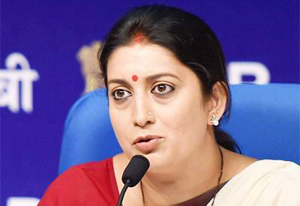Chennai, May 29: The Indian Institute of Technology Madras was at the centre of row today over derecognition of a students group, many of whom are Dalits, following a complaint that it was critical of Prime Minister Narendra Modi, triggering protests from Congress and AAP.
In Assam (rpt) Assam, Union HRD Minister Smriti Irani backed IIT's action, saying the institution has clearly stated that some procedures by the students' organisation was not followed and it knew that Dean will derecognise it for violating norms.
Scores of NSUI workers today held a protest outside Irani's official residence in Delhi over the issue.
The protesters from Congress' students wing raised anti-government slogans and accused the HRD Ministry of being behind the action against the body.
A senior official of the premier Central technical institute told reporters in Chennai that the Ambedkar-Periyar Study Circle(APSC) had "violated" defined guidelines of IIT-Madras.
"As per the guidelines in force, student bodies cannot use the name of IIT Madras or its official entities in any capacity to publicise their activities or garner support without official permission," Prof Ramamurthy, Acting Director, told reporters.
"This group has violated the guidelines while conducting their meeting," he said, adding that this leads to temporary derecognition of the group.
A separate statement by the institute said that while IIT-M does not "curtail" students' freedom of expression, "it is expected that student groups adhere to these guidelines while conducting their activities."
The Human Resource Development (HRD) ministry had forwarded a complaint made by some students about the APSC to the institute, accusing the group of creating "hatred" against Modi and instigating protests against Centre's policies.
Congress spokesperson Tom Vadakkan said this was an effort by state and central government to gag the democratic voices of the country.
He said Congress vice president Rahul Gandhi has repeatedly spoken about interference of fringe groups in the academic, non-academic and various sections of the government.
AAP leader Ashutosh asked whether students from Dalit community don't have a right to express their views on Prime Minister.
Irani said IIT, Madras was an autonomous institution which took its own decisions. "I know people in the Congress party are very much interested in finding some flaw with the HRD ministry. But I am sure that they understand that autonomous educational institutions have the right to administer their institution as per their own laws".
Asked about complaints that the students concerned were not given a hearing to present their case, Ramamurthy said the dean of students had asked them to appear before the Board of Students in August after the institute, closed for the summer vacations, reopens.
Asked if the action was taken on an "anonymous complaint" against APSC, the acting director said he was not aware of it.
Citing the complaint, the HRD Ministry had written to IIT-M management on May 15 seeking its comments on the issue.
APSC said that on May 22, it received a mail from Dean of Students, Sivakumar M Srinivasan, communicating that it was being derecognised for "misuse of privileges".
Srinivasan said APSC violated the code of conduct for student bodies that categorically stated that activities should have Dean's approval.
Several student organisations function in the campus operating on the basis of student involvement and initiatives, the institute said in a statement.
Students groups which desire to use the institute's resources are required to be recognised and have to follow the guidelines by the Board of Students which consists of all elected student representatives, it added.





Comments
Add new comment